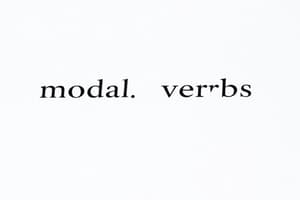Podcast
Questions and Answers
Which modal verb is generally used for making informal requests?
Which modal verb is generally used for making informal requests?
- Would
- Can (correct)
- Will
- Could
The modal verb 'can' is typically used to express past ability.
The modal verb 'can' is typically used to express past ability.
False (B)
Which modal verb is most commonly used for giving advice?
Which modal verb is most commonly used for giving advice?
should
For making predictions about the future, the most common modal verb to use is ______.
For making predictions about the future, the most common modal verb to use is ______.
Match the modal verb with its primary function.
Match the modal verb with its primary function.
Which of the following modal verbs is considered the most polite for making requests?
Which of the following modal verbs is considered the most polite for making requests?
Modal verbs change form depending on the subject (e.g., adding '-s' in the third person singular).
Modal verbs change form depending on the subject (e.g., adding '-s' in the third person singular).
Besides 'should', which modal phrase is also used to offer advice but is less common?
Besides 'should', which modal phrase is also used to offer advice but is less common?
To express a necessity weaker than 'must', one might use the modal verb phrase '______ to'.
To express a necessity weaker than 'must', one might use the modal verb phrase '______ to'.
Match each modal verb with what it expresses.
Match each modal verb with what it expresses.
Which modal verb is suitable for expressing habitual actions in the past?
Which modal verb is suitable for expressing habitual actions in the past?
The phrase 'had better' expresses a gentle suggestion.
The phrase 'had better' expresses a gentle suggestion.
Which modal verb expresses strong obligation or necessity?
Which modal verb expresses strong obligation or necessity?
The phrase '______ to' expresses ability in various tenses, offering a versatile alternative to 'can' and 'could'.
The phrase '______ to' expresses ability in various tenses, offering a versatile alternative to 'can' and 'could'.
Match the modal with its function in making requests.
Match the modal with its function in making requests.
Which modal verb can express a possible future outcome?
Which modal verb can express a possible future outcome?
The modal verb 'will' is never used for making requests, as it is solely for predictions.
The modal verb 'will' is never used for making requests, as it is solely for predictions.
Which modal verb is used to express a past habit or state that is no longer true?
Which modal verb is used to express a past habit or state that is no longer true?
The expression '______ not' or 'can't' expresses prohibition.
The expression '______ not' or 'can't' expresses prohibition.
Match the term with its usage.
Match the term with its usage.
Which of the following is NOT a main modal verb?
Which of the following is NOT a main modal verb?
Modals are always followed by a verb in the gerund form (verb + -ing).
Modals are always followed by a verb in the gerund form (verb + -ing).
Which modal verb is often used in British English to make offers or suggestions?
Which modal verb is often used in British English to make offers or suggestions?
When providing advice, '______' can be used to give gentle suggestions.
When providing advice, '______' can be used to give gentle suggestions.
Match the following phrases with the correct expression.
Match the following phrases with the correct expression.
In what context would 'Have to' most likely be used?
In what context would 'Have to' most likely be used?
'Might' expresses a stronger possibility than 'may'.
'Might' expresses a stronger possibility than 'may'.
Which modal verb can indicate past ability?
Which modal verb can indicate past ability?
In the sentence 'You ______ be on time', using the expression 'had better' implies a strong warning.
In the sentence 'You ______ be on time', using the expression 'had better' implies a strong warning.
Match the sentence with what the modal expresses.
Match the sentence with what the modal expresses.
Which sentence correctly uses a modal verb to express ability in the future?
Which sentence correctly uses a modal verb to express ability in the future?
The sentence 'You must to respect your elders' is grammatically correct since it uses a modal verb.
The sentence 'You must to respect your elders' is grammatically correct since it uses a modal verb.
Other than 'should' and 'ought to', which modal verb implies a weaker sense of obligation?
Other than 'should' and 'ought to', which modal verb implies a weaker sense of obligation?
The sentence 'When I was a child, I ______ visit my grandparents every summer' uses the modal verb 'would' to express a habitual action in the past.
The sentence 'When I was a child, I ______ visit my grandparents every summer' uses the modal verb 'would' to express a habitual action in the past.
Match the requests based on politeness.
Match the requests based on politeness.
Which sentences uses the correct modal verb for expressing a prohibition?
Which sentences uses the correct modal verb for expressing a prohibition?
Modal verbs can be used in conjunction with each other to create more complex meanings.
Modal verbs can be used in conjunction with each other to create more complex meanings.
Which expression is used for a past habit or state that has ended?
Which expression is used for a past habit or state that has ended?
To express external obligation, you might use the modal verb '______ to'.
To express external obligation, you might use the modal verb '______ to'.
Match the modal with the correct example
Match the modal with the correct example
Flashcards
What are modals?
What are modals?
Auxiliary verbs expressing possibility, necessity, permission, ability, obligation, or advice.
Form after modals
Form after modals
Modals are always followed by the base form of the verb (infinitive without 'to').
Do modals change form?
Do modals change form?
Modals do not change form regardless of the subject, even in the third person singular (no -s).
Examples of modals
Examples of modals
Signup and view all the flashcards
When to use "can"
When to use "can"
Signup and view all the flashcards
When to use "could"
When to use "could"
Signup and view all the flashcards
When to use "will"
When to use "will"
Signup and view all the flashcards
When to use "would"
When to use "would"
Signup and view all the flashcards
When to use "can" for ability?
When to use "can" for ability?
Signup and view all the flashcards
When to use "could" for ability?
When to use "could" for ability?
Signup and view all the flashcards
When to use "be able to"
When to use "be able to"
Signup and view all the flashcards
When to use "should"
When to use "should"
Signup and view all the flashcards
When to use "ought to"
When to use "ought to"
Signup and view all the flashcards
When to use "could" for suggestions
When to use "could" for suggestions
Signup and view all the flashcards
When to use "had better"
When to use "had better"
Signup and view all the flashcards
When to use "will" to predict the future?
When to use "will" to predict the future?
Signup and view all the flashcards
When to use "may/might" for predictions
When to use "may/might" for predictions
Signup and view all the flashcards
When to use "could" for possible outcomes
When to use "could" for possible outcomes
Signup and view all the flashcards
When to use "must"
When to use "must"
Signup and view all the flashcards
When to use "have to"
When to use "have to"
Signup and view all the flashcards
When to use "should/ought to" for obligation
When to use "should/ought to" for obligation
Signup and view all the flashcards
When to use "need to"
When to use "need to"
Signup and view all the flashcards
When to use "must not/can't"
When to use "must not/can't"
Signup and view all the flashcards
When to use "shall"
When to use "shall"
Signup and view all the flashcards
When to use "would"
When to use "would"
Signup and view all the flashcards
When to use "used to"
When to use "used to"
Signup and view all the flashcards
Study Notes
- Modals are auxiliary verbs that express various meanings such as possibility, necessity, permission, ability, obligation, and advice
- Modals are always followed by the base form of the verb (infinitive without "to")
- Modals do not change form regardless of the subject (no -s in the third person singular)
- The main modals are: can, could, may, might, must, shall, should, will, and would
- "Ought to" functions similarly to a modal verb
Usage in Requests
- Modals frequently used for making requests are "can," "could," "will," and "would"
- "Can" is generally used for informal requests: "Can you help me with this?"
- "Could" is more polite than "can": "Could you please pass the salt?"
- "Will" is used for polite requests, but it can sometimes sound demanding: "Will you close the window?"
- "Would" is the most polite and formal way to make a request: "Would you mind helping me?"
Expressing Ability
- "Can" is the primary modal verb used to express ability in the present: "I can speak Spanish."
- "Could" expresses past ability: "I could swim when I was five."
- "Be able to" is a more versatile way to express ability in different tenses: "I will be able to finish the project tomorrow."
Giving Advice
- "Should" is the most common modal for giving advice: "You should see a doctor."
- "Ought to" is similar to "should" but less common: "You ought to try the new restaurant."
- "Could" can also be used to give gentle suggestions: "You could try a different approach."
- "Had better" expresses strong advice or a warning: "You had better be on time."
Making Predictions
- "Will" is the most common modal for making predictions about the future: "It will rain tomorrow."
- "May" and "might" express possibility or uncertainty about the future: "It may rain later." or "It might snow tonight."
- "Could" can also indicate a possible future outcome: "They could win the game."
Indicating Obligation
- "Must" expresses a strong obligation or necessity: "I must finish this report today."
- "Have to" is similar to "must" but often expresses external obligation: "I have to wear a uniform to work."
- "Should" and "ought to" can also express a weaker sense of obligation: "You should respect your elders."
- "Need to" expresses a necessity, which can be weaker than "must": "I need to buy groceries."
- "Must not" or "can't" expresses prohibition: "You must not smoke here." or "You can't park here."
Other modal verbs and expressions
- "Shall" is used to make offers or suggestions, especially in British English: "Shall we go for a walk?"
- "Would" is used to express habitual actions in the past: "When I was a child, I would visit my grandparents every summer."
- "Used to" expresses a past habit or state that is no longer true: "I used to smoke, but I quit."
Studying That Suits You
Use AI to generate personalized quizzes and flashcards to suit your learning preferences.




